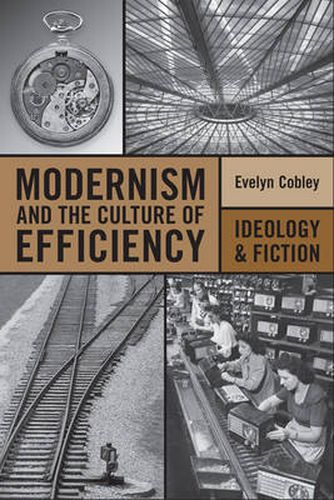Readings Newsletter
Become a Readings Member to make your shopping experience even easier.
Sign in or sign up for free!
You’re not far away from qualifying for FREE standard shipping within Australia
You’ve qualified for FREE standard shipping within Australia
The cart is loading…






Modernism and the Culture of Efficiency engages with the idea of efficiency as it emerged at the beginning of the twentieth century. Evelyn Cobley’s close readings of modernist British fiction by writers as diverse as Aldous Huxley, Joseph Conrad, and E.M. Forster identify characters whose attitudes and behaviour patterns indirectly manifest cultural anxieties that can be traced to the conflicted logic of efficiency.
Revisiting the principles of work developed by Henry Ford and F.W. Taylor, Cobley draws out the broader social, political, cultural, and psychological implications of the assembly line and the efficiency expert’s stopwatch. The pursuit of efficiency, she argues, was the often unintentional impetus for the development of social control mechanisms that gradually infiltrated the consciousness of individuals and eventually suffused the fabric of society. Evelyn Cobley’s sophisticated analysis is the first step in understanding an ideology that has received little attention from literary critics despite its broad sociocultural implications.
$9.00 standard shipping within Australia
FREE standard shipping within Australia for orders over $100.00
Express & International shipping calculated at checkout
Modernism and the Culture of Efficiency engages with the idea of efficiency as it emerged at the beginning of the twentieth century. Evelyn Cobley’s close readings of modernist British fiction by writers as diverse as Aldous Huxley, Joseph Conrad, and E.M. Forster identify characters whose attitudes and behaviour patterns indirectly manifest cultural anxieties that can be traced to the conflicted logic of efficiency.
Revisiting the principles of work developed by Henry Ford and F.W. Taylor, Cobley draws out the broader social, political, cultural, and psychological implications of the assembly line and the efficiency expert’s stopwatch. The pursuit of efficiency, she argues, was the often unintentional impetus for the development of social control mechanisms that gradually infiltrated the consciousness of individuals and eventually suffused the fabric of society. Evelyn Cobley’s sophisticated analysis is the first step in understanding an ideology that has received little attention from literary critics despite its broad sociocultural implications.